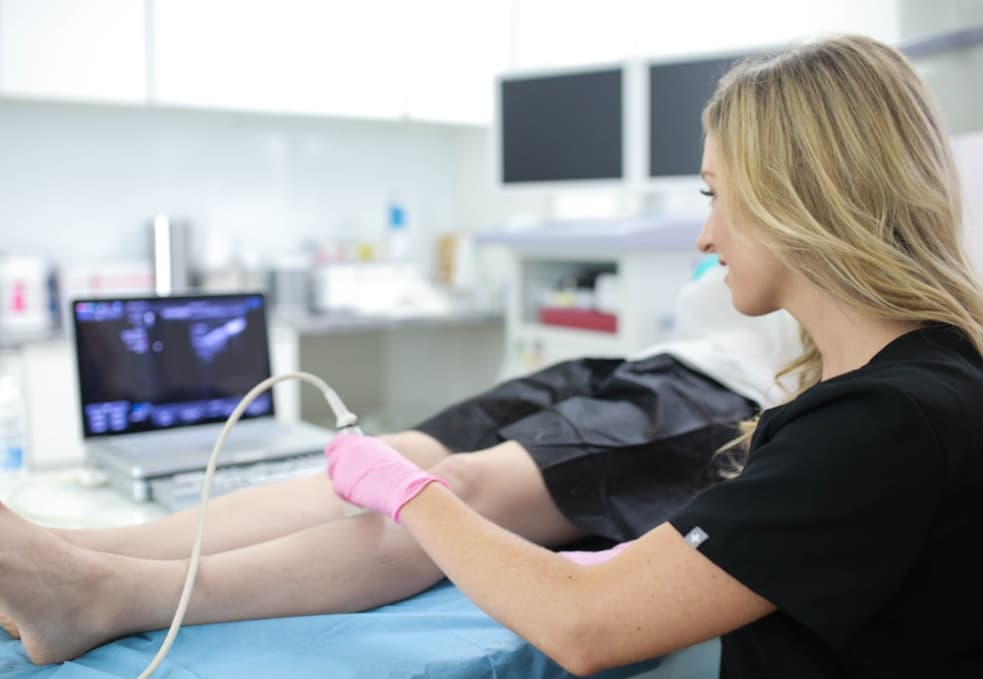Do vascular surgeons treat varicose veins?
The vast majority of vascular surgeons do indeed treat varicose veins. In fact, many vascular surgeons specialize in treating venous disorders, including varicose veins. There are several ways to treat varicose veins, and a vascular surgeon will recommend the best course of treatment for each individual patient. Some of the more common varicose vein treatments in Long Island include sclerotherapy, laser ablation, and ambulatory phlebectomy.
Long Island Vein Treatment is a group of state-of-the-art medical centers specializing in varicose vein treatments in Long Island. Our medical centers are led by board-certified vein doctors specializing in cutting-edge, minimally invasive treatments for varicose veins, including laser ablation and ambulatory phlebectomy. Our vein doctors always diagnose and treat the root cause of varicose veins — not just the symptoms.
You can find our state-of-the-art medical centers for vein treatment in the following locations:
- Our medical center for vein treatment in West Islip is located at 500 Montauk Highway, Suite G, West Islip, right on the border of Suffolk County and Nassau County.
- Our medical center for vein treatment in Jericho is located at 350 Jericho Turnpike Suite 1A, Jericho, right off the Long Island Expressway and Northern State Parkway.
- Our medical center for vein treatment in Hampton Bays is located at 225 W Montauk Highway, Suite 3, a short drive from South Hampton, Water Mill, and East Hampton.
If you suffer from varicose veins, it is worth making an appointment with a vein doctor to discuss your treatment options. Please schedule an appointment at your nearest medical center for varicose vein treatment in Long Island.
What conditions do vascular surgeons treat?
Vascular surgeons are medical doctors who specialize in diagnosing and treating conditions that affect the arteries and veins. They often focus on dangerous and life-threatening conditions, such as aneurysms, arteriosclerosis, peripheral vascular disease, and chronic venous insufficiency. While vascular surgeons can also treat spider veins and varicose veins, they’re not the right specialists for that purpose. Varicose veins don’t need surgical procedures, so you don’t have to consult vascular surgeons for their treatment.
Thanks to recent advancements in vein care and technology, most vein-related conditions, such as spider veins, varicose veins, and chronic venous insufficiency, can be treated using minimally invasive procedures. If you have vein problems, you must contact board-certified vein doctors or phlebologists instead of vascular surgeons. Vein doctors diagnose and treat the root cause of your vein problems using minimally invasive varicose vein treatments, such as radiofrequency ablation, endovenous laser ablation, sclerotherapy, and ambulatory phlebectomy.
What conditions do vein doctors treat?
Vein doctors, also known as phlebologists, are medical professionals who specialize in diagnosing and treating disorders of the veins. Veins are the blood vessels that carry blood from the body’s tissues back to the heart. When these vessels are healthy, they work efficiently to transport blood. However, when they become diseased or damaged, they can cause a variety of problems. Vein doctors diagnose the root cause of your vein problems to curate a personalized treatment plan and ensure long-lasting relief.
Some of the most common conditions that vein doctors treat are varicose veins and spider veins. Varicose veins are larger, more visible veins that often appear twisted or bulging. They are usually found on the legs and can be painful. Spider veins are smaller, red or blue veins that often look like a spider’s web. They are usually found on the face or legs. Vein conditions are often caused by a build-up of pressure in the veins, which can lead to pain, swelling, and other symptoms.
Other conditions that vein doctors treat include venous insufficiency, deep vein thrombosis (DVT), and lymphedema. Venous insufficiency is a condition in which the veins are unable to pump blood efficiently back to the heart. This can cause blood to pool in the legs and lead to the development of varicose veins. DVT is a blood clot that forms in a deep vein, usually in the leg. If the clot breaks loose, it can travel to the lungs and cause a potentially fatal condition called pulmonary embolism.
If you are experiencing any symptoms associated with vein disorders, it is important to see a vein doctor for diagnosis and treatment. Symptoms to watch out for include pain, swelling, cramping, fatigue, itching, and skin changes. Vein doctors use a variety of diagnostic tests to evaluate vein disorders, including duplex ultrasound and CT scan. Varicose vein treatment options vary depending on the condition but may include lifestyle changes, medications, and minimally invasive procedures.
How to get rid of swollen varicose veins?
Some of the most common minimally invasive varicose vein treatments in Long Island are sclerotherapy, endovenous laser ablation, and ambulatory phlebectomy.
- Sclerotherapy is a minimally invasive procedure that involves injecting a sclerosing solution into the affected veins. The solution causes the veins to fuse together and collapse, turning into hardened scar tissues. The veins will then get absorbed by the body over time.
- Endovenous laser ablation is a minimally invasive procedure that uses a laser to heat the diseased saphenous vein. This causes the vein to collapse and the accumulated blood to reroute into healthier veins. The diseased vein is absorbed by the body over time.
- Ambulatory phlebectomy is a minimally invasive procedure that involves making small incisions in the skin to remove the affected veins. The diseased veins soon get reabsorbed by the body.
In addition to minimally invasive varicose vein treatments, you can also implement some lifestyle changes. You should wear compression stockings, exercise regularly, walk frequently, and elevate your legs while sitting down — these lifestyle changes will improve blood circulation and prevent varicose veins from worsening. But the only way to treat varicose veins is with minimally invasive varicose vein treatments in Long Island.
